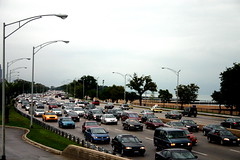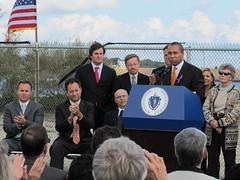
Homes evacuated. Chemicals fouling the air. Wildlife soaked in tar sands oil. Could it happen in New England?
I traveled to Arkansas last week to monitor wildlife impacts of the Exxon Mobil Pegasus tar sands pipeline rupture for the National Wildlife Federation. I kept thinking, if the tar sands industry gets its wish and
reverses the Trailbreaker pipeline across northern New England to carry tar sands, will I be in New Hampshire covering a spill like this in a few years?
The parallels to the Exxon Mobil Pegasus pipeline are eerie: An old pipeline built to supply oil where it was needed, now reversed to carry corrosive tar sands at high temperature and pressure to supply profit to Canada's polluting tar sands industry. Exxon claimed Pegasus was safe, right up until a 22-foot-long gash opened in it below an Arkansas subdivision, unnoticed until local homeowners called 911.
A Boston Globe editorial
raises all the right questions:
As President Obama weighs approval of Keystone XL sometime this year, concern over tar sands oil has spread from the Midwest to New England. Hundreds of people rallied earlier this year in Portland, Maine, against even the possibility that such crude from Alberta, which environmentalists say is the stickiest and dirtiest form of oil, would wind its way through the pristine lakes, rivers, and rugged terrain of Vermont, New Hampshire, and Maine. Five years ago, Enbridge floated a proposal to reverse pipelines that currently send imported oil into the interior of New England from the marine terminal in Portland, Maine. Instead, Enbridge would transport oil from the tar sands of Canada to tankers in Portland, bound for southern refineries along the Atlantic and Gulf coasts. Enbridge managing director Steve Letwin said in a 2008 investor conference call, “We’re pretty excited about this opportunity,” because it was a much cheaper alternative for that company than building a new pipeline such as Keystone. [...]
[T]he endless Kalamazoo cleanup, and disputes now erupting in Arkansas as to how much damage is being done by that spill, raise inevitable questions that must be answered before anyone should contemplate reversing the pipelines through New England. Though Keystone is foremost in the mind of the White House, the EPA and NTSB should also take the time to assess the risk of bringing tar sands oil through one of the most beautiful and environmentally sensitive parts of the United States.
Much stronger safety standards are clearly needed for existing tar sands pipelines, as the
National Wildlife Federation and partners from Texas to Maine have called for. But the bigger question is,
why are we letting America serve as the middleman to get Canadian tar sands to the international market at all?
Whether it's Pegasus, Trailbreaker or Keystone XL, these tar sands pipelines all have one thing in common: They go to coastal ports. America gets all the risk of spills and
climate disruption, the international market gets all the oil, and Canadian tar sands producers get all the profit.
Right now, the national debate centers on Keystone XL, and that's where you need to make your voice heard.
Please take a moment right now to ask President Obama to say no to Keystone XL. If we can stop Keystone XL, we can turn the tide against dirty tar sands oil.
Or maybe in a few years we'll be looking at
pictures of oiled wildlife and
watching videos of oiled creeks in northern New England. It's up to us to raise our voices loud enough that Canada will be forced to look elsewhere to peddle its dirty tar sands oil.
 With Tim Kaine taking a bold stand against the dirty, destructive Keystone XL tar sands pipeline, has my long history of questioning Kaine's motives come to the end of the road?
With Tim Kaine taking a bold stand against the dirty, destructive Keystone XL tar sands pipeline, has my long history of questioning Kaine's motives come to the end of the road?





